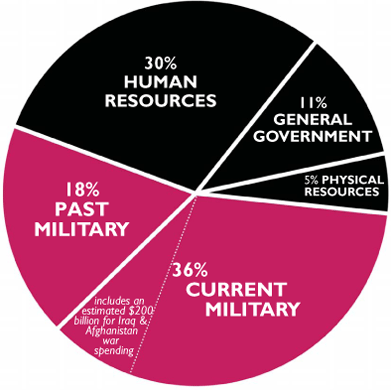
Juan Cole takes Defense Secretary Gates to task for criticizing Europe’s “general anti-war sentiment.”
An AFP story earlier this week quoted Gates as saying:
The demilitarization of Europe — where large swaths of the general public and political class are averse to military force and the risks that go with it — has gone from a blessing in the 20th century to an impediment to achieving real security and lasting peace in the 21st.
Cole rightly sees this as being a little rich coming from a country in the process of beggaring itself on war expenditures.
[A]s far as I can tell, Europe is the world’s largest economy and got there without any recent substantial wars except those the US dragged it into. Moreover, the fastest-growing economy for the past nearly 30 years has been China, which spends a fraction on their military of what the US spends on its, and, aside from a skirmish with Vietnam in the early 1980s, has been at peace. Apparently massive war expenditures are unrelated to economic growth or prosperity.
In contrast, the US has been at war for 19 of the last 47 years (not counting US-backed insurgencies such as 1980s Afghanistan, on which we spent billions) but has not grown faster than the other two economically. Moreover, the increasingly unwieldy US national debt, deriving from the US government spending more than it took in in recent decades, would not exist if the US military budget had been the same as that of the European Union since 1980. The US overspent on its military because Washington mistakenly thought the Soviet economy was twice as big as it actually was, and vastly over-estimated Soviet military capabilities. The bloated military budgets continue now, apparently because of a couple thousand al-Qaeda operatives hiding out in caves in the Hadhramawt and Waziristan.
I would go further, and say Europe is spending way more than it should on soldiers and guns and bombers and rockets. The U.S. military budget is officially over $700 billion, but in reality it’s closer to a trillion and a half dollars. The Europe Union spends $289 billion on its toys. In contrast, China’s 2009 military budget was $122 billion. Economic growth comparison?
US economic growth 2009: 0.2%
European Union economic growth 2009: -4%
China economic growth 2009: 8.7 %
Hmm. I wonder if one thing has to do with another here.
And I also wonder what the endgame will look like. In my darker moments, I worry that the day is not far off when the U.S. will no longer be able to print or borrow money (the same thing, in our case). At that point, what will stop our government from using its military might against its creditors?

